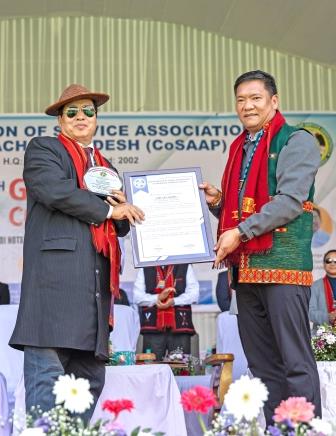-
 Startup success stories reflect potential of state’s youth: CM
Startup success stories reflect potential of state’s youth: CM
-
 Mein participates in vintage Willys Jeep Rally, inaugurates World War…
Mein participates in vintage Willys Jeep Rally, inaugurates World War…
-
DG Assam Rifles visits Khonsa Battalion
-
Governor advises DGP to take firm action on illegal migration
-
International white water kayaking to be held on the Tawang…
-
Raja convenes high-level meeting on effective traffic management
-
 NPS concerns genuine, needs careful consideration: CM Khandu
NPS concerns genuine, needs careful consideration: CM Khandu
-
Women-run kitchens showcase local cuisine
-
 Team Arunachal Pradesh participates in IICDEM 2026; leads thematic…
Team Arunachal Pradesh participates in IICDEM 2026; leads thematic…
-
24hr bandh hits normal life in Lower Subansiri
It has always been unequivocally acknowledged both by those knowledgeable about the domain of law as well as common people that Indian Judiciary through many of its astute observations and sound judgements over the decades has brought far-reaching changes in society. The court of the Additional Chief Metropolitan Magistrate in Delhi on Wednesday was the venue of one such finest ‘delivery’ and the verdict that came indeed marked a moment of triumph for all women in the country who long for two very critical issues- justice and empowerment. The court while delivering its judgement in the Priya Ramani vs MJ Akbar case which falls in the legal genre of defamation that went on for around two years observed in most-vocal terms that the ‘right of reputation can’t be protected at the cost of right to dignity’. The acquittal of the former from the charge of defamation brought by the latter is a historic moment for the much-overlooked issue of women’s justice as it is for Indian jurisprudence.
A quick recap of the case will make all remember that it created an uproar in 2018, a phase which saw the #MeToo movement gathering strength when journalist Priya Ramani made an allegation of sexual misconduct against Akbar which he allegedly committed way back in 1993. As a legal response, Akbar, a journalist-turned-politician and a Union Minister in the first term of the current NDA government at the Centre filed the complaint against Ramani bringing a direct charge of defamation. The verdict that came after a legal battle that lasted for two years has been extraordinary in the sense it has recognised and tried to address several loopholes, both in the interpretation and the justice delivery mechanism of cases pertaining to sexual offences against women at workplaces. “The woman cannot be punished for raising her voice against sex abuse on the pretext of criminal complaint of defamation as the right of reputation cannot be protected at the cost of the right of life and dignity of woman as guaranteed in Indian Constitution under Article 21 and right of equality before law and equal protection of law as guaranteed under Article 14 of the Constitution. The woman has a right to put her grievance at any platform of her choice and even after decades,” the 91-page judgement observed. It’s highly relevant to note also that the time of the incident’s occurrence was much before the issuance of the Vishaka Guidelines (emanating from the famous Vishaka & Others vs State of Rajasthan case in 1997) by the Supreme Court and enactment of The Sexual Harassment of Women at Workplace (Prevention, Prohibition and Redressal) Act, 2013.
The crux of the legal enlightenment is that however reputed or influential a male member of society might be, women from now onwards will have wider opportunity to stand up against all sexual wrongdoings they are being subjected to. The verdict definitely will make their voices stronger.

Kenter Joya Riba
(Managing Editor)She is a graduate in Science with post graduation in Sociology from University of Pune. She has been in the media industry for nearly a decade. Before turning to print business, she has been associated with radio and television.
Email: kenterjoyaz@easternsentinel.in / editoreasternsentinel@gmail.com
Phone: 0360-2212313

